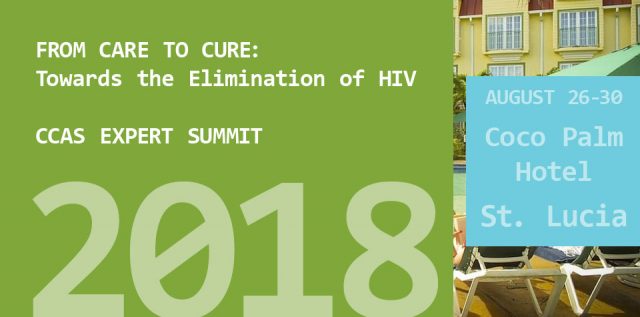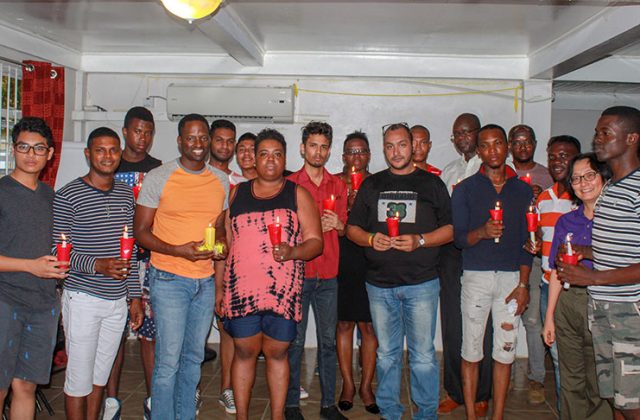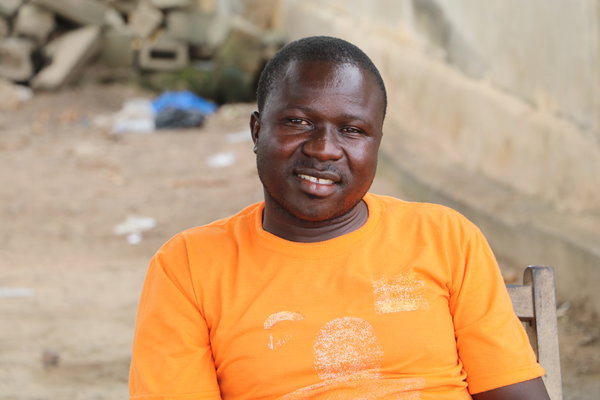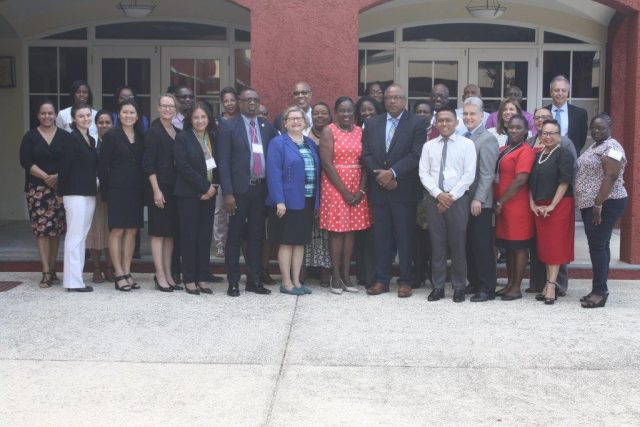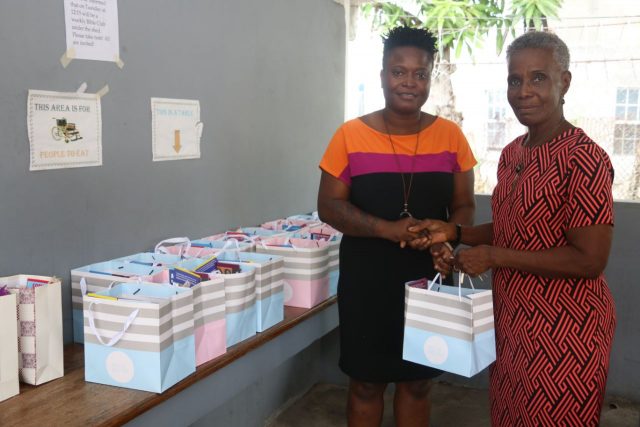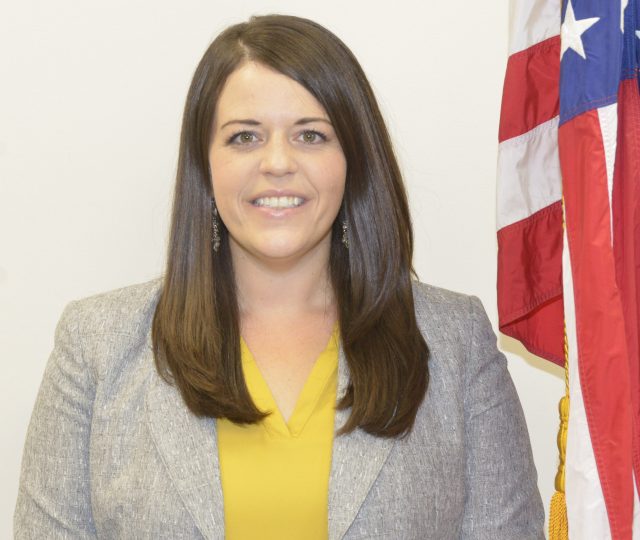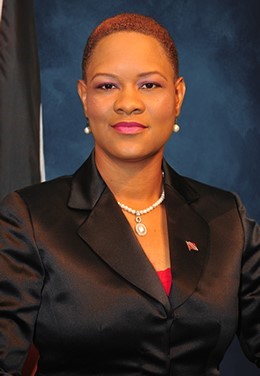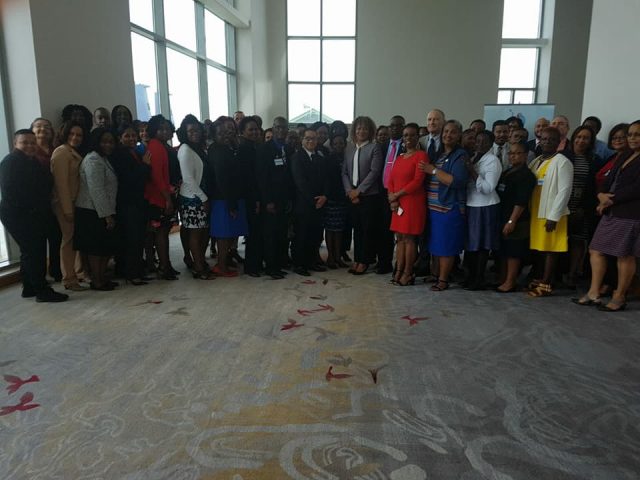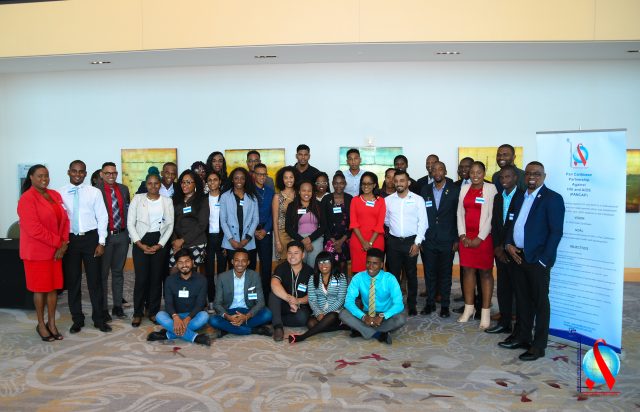Friday, 18 May 2018 (PANCAP Coordinating Unit, CARICOM Secretariat): The Pan-Caribbean Partnership against HIV and AIDS (PANCAP), the mechanism that provides a structured and unified approach to the Caribbean’s response to the HIV epidemic, commenced the Second Regional Meeting of Youth Leaders on Sexual and Reproductive Health and HIV and AIDS on 18 May 2018 in Port-of-Spain, Republic of Trinidad and Tobago.
In his opening remarks, Director of PANCAP, Mr. Dereck Springer, lauded the PANCAP Youth Steering Committee for developing and executing the agenda and methodology for the Second Youth Meeting. “This is clear indication of your growth since the First Meeting of Youth”, stated the Director, “I wish to commend the entire Youth Network for taking definitive steps in advocating for the priority areas identified at the previous meeting”.
The priority areas included (1) the dissonance between the age of sexual consent (16 years), and the age for independent access to health care (18 years), (2) the implementation of Comprehensive Sexuality Education in all schools in the Caribbean and (3) Gender inclusive laws that protect victims of sexual exploitation.
The PANCAP Director highlighted the additional progress since the first meeting, which included the establishment of the PANCAP Youth Advocacy Steering Committee and a specialized training workshop held in January 2018 designed to equip participants with skills to develop an advocacy strategy. He shared his expectations that the meeting would reach agreements on innovative and practical actions for advancing the key priority areas identified in the Caribbean Regional Youth Advocacy Framework (CRYAF) on Sexual and Reproductive Health and Rights, as well as on key issues for advocacy within their respective countries. He urged the youth advocates to collaborate with the PANCAP Coordinating Unit, other stakeholders and each other to implement those actions. Mr. Springer indicated that PANCAP would facilitate their participation in high-level fora.
The Chair, PANCAP Youth Advocacy Steering Committee, Mr. Kevin Mendez stated that he has experienced significant positive change in his life since as a gay man, he is able to openly share his story and experience in the Caribbean, which has legislation that “impede on the rights of LGBT persons”. The Chair thanked PANCAP for creating a safe space for youth to have discourse and create a plan of action for regional advocacy.
He further stated that the meeting would focus on creating effective methods to advocate for the aforementioned key issues, which he believes, have a direct impact on the quality of life of young people, especially young key populations: young gay men, Men who have sex with men (MSM), and Transgender-persons, who have the highest HIV prevalence in the region.
Mr. Mendez further explained that in “the last year, with the support of PANCAP and the Youth Advocacy Steering Committee, we have received the mentorship to improve our advocacy skills to address our priority areas in our country context”.
He challenged participants to actively participate in discussions, invited them to be open and comfortable to share their challenges and opportunities in advocating for change. He also explained that the forum will be important for formalizing initiatives and effective communication among the youth network.
“One country cannot move ahead of another. Our issues, our needs are the same and you are all brilliant and passionate key players from whom we can learn and share a wealth of knowledge”, stated Mr Mendez, “we are one young Caribbean family and as such we have the responsibility to work together at the country level and as a region”.
In addition, he reminded participants that in 2017 there was a 1% increase of HIV infections among young men. “This HIV epidemic is killing our youth, our friends and families and our society”, implored Mr. Mendez, “we have been told we are the future but with HIV and HIV-related discrimination, our tomorrow in not certain. This is our time to take action, work together, stay informed and be real!”
During remarks, Mr. André Browne, Dean, CARICOM Youth Ambassadors Programme (CYAP), stated that the CYAP can function as a key resource for reaching youth and gathering youth voices at a decision-making level for all matters regarding CARICOM.
He highlighted that PANCAP has understood the need for Caribbean Youth Ambassadors (CYAs) to have opportunities to get together to share experiences, plan activities and receive the training they need to ensure their efforts are effective in their communities.
Mr. Browne explained that PANCAP has been a key support for the programme, bringing together CYAs with other youth to discuss ending AIDS since 2017. He revealed that for most of the CYAs present at the inaugural meeting, it was the first time they were able to meet in person. “Deans before me have effusively sang the praises of PANCAP and rightly so, the PANCAP leadership’s dedication to youth involvement is remarkable and must be applauded” stated the CYAP Dean, “from carving out a space for us in the form of these youth meetings to ensuring we have a voice at high-level decision making meetings such as the PANCAP Regional Coordinating Mechanism (RCM) and Executive Board, and building our capacity through the recently concluded Local Capacity Initiative (LCI), even allowing us the use of their online platform for meetings”.
He informed the meeting that his goal is to renew the charge to the youth participating in the meeting, particularly the CYAs. Mr. Browne stated “the meeting comes at a time when 15 to 24-year-olds account for one-third of new HIV infections in the Caribbean, and at a time when almost half (46.2%) of Caribbean young people ages 15 – 24 did not have adequate knowledge about HIV, and at a time when two of five (38.6%) young people ages 15 – 24 did not use a condom the last time they had sex. It is time we act”.
He challenged participants to utilize the forum to formalize an actionable plan based on the CRYAF particularly on Comprehensive Sexuality Education, access to care for youth and creation of gender inclusive laws. He emphasized that the forum is another positive step to achieving the 2030 goal of zero AIDS among adolescents and the 90-90-90 Targets.
In her keynote address, Youth Advocate, Ms. Terry-Ann Roy, Alliance for Justice and Diversity, advocated for the removal of laws, which discriminate against sexual, gender minorities, and prevent them from accessing proper health care and information through fear of stigma and discrimination.
“We have to join forces in all areas of our activism because these issues intersect with each other”, stated Ms. Roy “when LGBT persons are discriminated within the law, this affects how they navigate the health-care system and how they access the necessary information to prevent contracting HIV as well as treatment if they need it. These laws do not only affect gay people but also those who are also listed as key populations in PANCAP’s own initiatives to end HIV and AIDS”.
She explained that these persons include sex workers, Trans women, People living with HIV (PLHIV), MSM, young women, girls and neglected persons who do not have access to these services. She stated, “we must recognize how these issues interconnect and work together, unite to combat these discriminatory laws and demand better policies and modified legislation. This is why we are here today and this why we will continue to return to get the necessary information to arm ourselves and approach these policymakers and parliamentarians with our demands. I stress on demands because we are entitled to these rights. It is written in all our constitutions. The right to freedom of expression, liberty, equality before the law, family life and dignity. Simply echoing that some laws are not enforced do not grant us the dignity we deserve”.
The opening ceremony was chaired by Ms. Alexus D’Marco, Vice Chair of the PANCAP Youth Steering Committee.
The meeting comes approximately one year after the First Meeting of Youth Leaders and two years ahead of the 2020 deadline for reaching the 90-90-90 Targets. It is expected to culminate with the development of advocacy supporting tools and materials for youths to advocate at the highest-level for the end of AIDS by 2030.
– ENDS –
What is PANCAP?
PANCAP is a Caribbean regional partnership of governments, regional civil society organisations, regional institutions and organisations, bilateral and multilateral agencies and contributing donor partners which was established on 14 February 2001. PANCAP provides a structured and unified approach to the Caribbean’s response to the HIV epidemic, coordinates the response through the Caribbean Regional Strategic Framework on HIV and AIDS to maximise efficient use of resources and increase impact, mobilises resources and build capacity of partners.
What are the Joint United Nations Programme on HIV and AIDS (UNAIDS) 90-90-90 Targets?
• By 2020, 90% of all people living with HIV will know their HIV status.
• By 2020, 90% of all people with diagnosed HIV infection will receive sustained antiretroviral therapy.
• By 2020, 90% of all people receiving antiretroviral therapy will have viral suppression.
Contact:
Timothy Austin
Communications Specialist
PANCAP Coordinating Unit
CARICOM Secretariat
Turkeyen, Greater Georgetown, Guyana
Email: taustin.consultant@caricom.org
Tel: (592) 222-0001-75, Ext. 3409 | Visit www.PANCAP.org
Editor’s Notes:
Overview of PANCAP Youth Initiatives
The Caribbean Regional Strategic Framework (CRSF) 2014-2018 articulates the vision and collective priorities of Caribbean states through their membership in the Pan Caribbean Partnership against HIV and AIDS (PANCAP). The CRSF recognizes that resources must be strategically allocated to target the epidemic at regional, country, community and individual levels. Doing so effectively will require establishing and sustaining an enabling environment (Strategic Priority Area 1) by addressing social and cultural drivers of the epidemic and by removing barriers to access sexual and reproductive health information, education and services. In particular, more conscious efforts to address human sexuality are needed in order to equip young people with the regional public goods including knowledge and tools they need for healthy development.
As of 2014, there were 280 000 [210 000–340 000] people living with HIV, 8800 [5700–13 000] AIDS-related deaths among adults, and 44% [33%-54%] of adults living with HIV accessing HIV treatment in the Caribbean. Young people, especially among key populations, in Caribbean are disproportionately at risk of HIV infection, and they face greater barriers to accessing prevention services. According to the Pan American Health Organization (PAHO), HIV prevalence among young people is 0.07% and 0.05% in females and males in the non-Hispanic Caribbean and 0.2% and 0.3% in the Hispanic Caribbean both respectively. In Jamaica, where the data are available, higher estimated HIV prevalence has been reported among gay, men that have sex with men (14%) and transgender adolescent girls (27%). While the regional response has realized some progress with a 43% reduction among adults and a 90% reduction in children acquiring HIV, gaps and challenges remain. HIV prevalence remains high among Key Populations (KPs) such as Sex Workers (SW), Men who have Sex with Men (MSM), and young people. At the same time, challenges regarding stigma and discrimination, violations of human rights and gender-based violence continue to hinder access to services for young people in general.
To work more systematically with young people belonging to KPs who are more difficult to reach, PANCAP/Global Fund grant programme proposed to collaborate with CVC/COIN to link at-risk youth with the CYAP. The CYAP provides a unique platform for leadership development and collaboration that can strengthen the participation of a more diverse and better-informed youth constituency in CARICOM decision-making. This will serve a mutually beneficial purpose of strengthening the relevance and impact of the Youth Ambassadors as well as providing access to high-level CARICOM fora for KP youth, allowing for collaborative approaches to high-level advocacy that better links the issues and priorities of CARICOM to those of young people. This initiative supports the inclusion and participation of some Key Population groups (i.e. PLHIV, MSM, SW and youth) in the regional response addressing the critical gaps given the overwhelming evidence of the main drivers of HIV transmission in these groups.
The First Meeting of Youth Leaders held in April 2017 allowed for in-depth discussion of sexual health issues affecting young people, identified what are barriers to their access to sexual health services, as well as identify what knowledge and tools are required to protect themselves from HIV. The meeting provided input required to develop a regional advocacy framework on key sexual health issues affecting youth and to inform subsequent training to strengthen advocacy skills of regional youth leaders. This has strengthened the inclusion of youth leaders in the regional and national responses to work towards a more coherent and holistic approach to issues affecting youth from key populations and young people living with HIV: the dissonance between the age of sexual initiation (before age 15), prevailing legislation on the age of consent (16 years), and the age for independent access to health care (18 years) with the exception of Jamaica in which age for independent access to health care is 16, the implementation of Comprehensive Sexuality Education in all schools in the Caribbean and Gender neutral laws that protect victims of sexual exploitation.
The formalization of a Steering Committee on Youth Advocacy and follow up meetings are an innovative approach to mobilise regional youth leaders to actively engage in high-level advocacy and policy dialogues by linking the CYAP with PLHIV youth leaders and other sexual and reproductive health youth activities/leaders.
The Second Meeting of Youth Leaders will provide the opportunity for in-depth discussion on the achievements and challenges confronted by youth leaders in addressing the three priority areas identified in the Caribbean Regional Youth Advocacy Framework (CRYAF) to set in motion practical advocacy tools and techniques that can be adapted per country context. This meeting will serve to identify regional and international mechanisms that can be used as best practice models for the achievement of priority objectives, provide the opportunity to exercise advocacy techniques with parliamentarian(s), CSO representation and CYAs through a panel discussion addressing sexual and reproductive health issues and concerns identified by youth leaders. The meeting will enable the adaptation of a standardized data collecting and reporting tool used by youth leaders in their respective countries. This will better inform PANCAP of opportunities to support an innovative approach to mobilize regional youth leaders to actively engage in high-level advocacy, as well as further develop advocacy tools and materials to review and address policies, practices and laws that affect young people’s vulnerabilities to HIV.
Helpful links:

